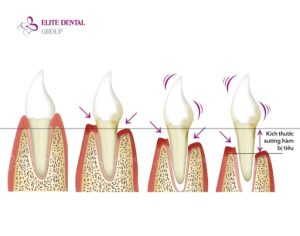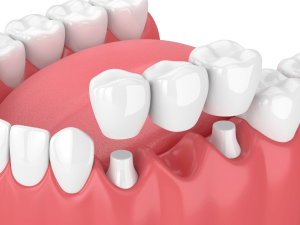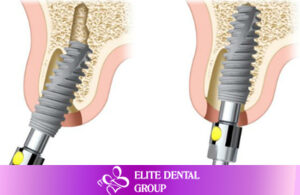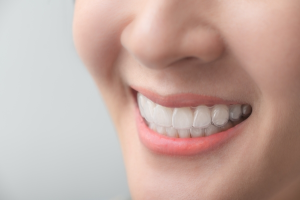Table of content
- 1. What Are the Causes of Tooth Loss?
- 2. Consequences of Tooth Loss: 7 Lesser-Known Impacts
- 2.1 Impact on Aesthetics
- 2.2 Reduced Chewing Function, Affecting Digestion
- 2.3 Unclear Speech
- 2.4 The consequences of tooth loss include misalignment and malocclusion.
- 2.5 Impact on the temporomandibular joint, causing headaches and neck pain
- 2.6 Causes Various Oral Health Issues
- 2.7 High risk of jawbone resorption leading to sunken cheeks and premature aging
- 3. What to do when you lose a tooth?
- 4. What are safe and long-lasting tooth replacement solutions?
- 5. How to Prevent Tooth Loss
Losing even one or a few teeth is a serious concern, affecting not only aesthetics and confidence in communication but also causing difficulties in chewing, impacting oral health, and reducing quality of life. In the following article, let’s explore the causes with Elite Dental and consequences of tooth loss, as well as the best ways to address this condition.
1. What Are the Causes of Tooth Loss?
Tooth loss can result from various factors, including:
Poor Oral Hygiene: Neglecting brushing, not cleaning between teeth with floss, and skipping regular dental cleanings can lead to bacterial infections and increase the risk of tooth loss.
Dental Diseases: Conditions such as gum disease, tooth decay, root infections, and pulpitis, if not treated promptly, can result in tooth loss.
Poor Nutrition: A diet high in sugary foods, lacking in essential nutrients like calcium and potassium, can weaken teeth and make them more prone to loss.
Accidents, Trauma: Significant force from impacts or accidents can damage or dislodge teeth, leading to their loss.
Underlying Health Conditions: Individuals with chronic conditions such as high blood pressure, cardiovascular disease, or diabetes often have weaker teeth, increasing the risk of tooth loss.
Unhealthy Habits: Habits like smoking, grinding teeth, and consuming excessively soft or hard foods can contribute to tooth loss.
Aging: Tooth loss can occur at any age, but it is more common among older adults due to natural wear and tear, enamel erosion, and weakening of teeth over time.
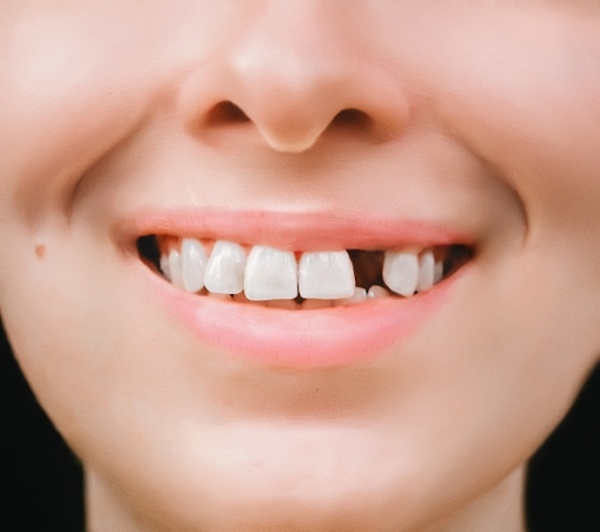
2. Consequences of Tooth Loss: 7 Lesser-Known Impacts
Tooth loss, regardless of the location, can cause many inconveniences in chewing as well as affect overall oral health. Here are 4 consequences of tooth loss you should be aware of:
2.1 Impact on Aesthetics
Losing a tooth, especially in visible areas such as the front teeth or canines, greatly affects facial aesthetics, causing many individuals to feel self-conscious and less confident in social interactions. Furthermore, prolonged tooth loss can lead to a sunken cheek appearance, increased wrinkles, and an overall imbalance and lack of harmony in the facial structure.
View more: Lost a front tooth? Here’s the best solution
2.2 Reduced Chewing Function, Affecting Digestion
Each tooth plays a unique role in chewing; front teeth tear food, while molars grind it. Therefore, tooth loss means a decrease in chewing efficiency, resulting in inadequately chewed food and potential digestive issues. Additionally, difficulty in chewing can lead to loss of appetite, impacting overall health.
2.3 Unclear Speech
A gap from a missing tooth can cause excessive air escape during speech, leading to difficulty in pronouncing words accurately, especially those with fricative sounds. Furthermore, missing front teeth can disrupt the relationship between the teeth, lips, and tongue, causing speech impediments like lisping or slurred speech, which can affect confidence in communication.
2.4 The consequences of tooth loss include misalignment and malocclusion.
A gap from a lost tooth creates a significant space, causing adjacent teeth to lose support. Over time, these neighboring teeth may shift towards the empty space, resulting in misalignment, malocclusion, and potentially leading to temporomandibular joint disorders and pain in the temporal region.
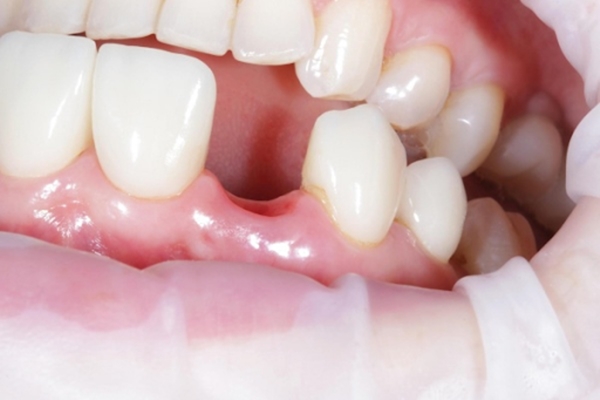
2.5 Impact on the temporomandibular joint, causing headaches and neck pain
Losing one or more teeth can result in the surrounding teeth losing their support and gradually shifting unpredictably. This increases the chewing force on adjacent teeth, which over time can significantly impact the range of motion in the temporomandibular joint, leading to headaches, neck pain, and discomfort in the shoulders and neck.
2.6 Causes Various Oral Health Issues
The gap left by a lost tooth creates an environment conducive to harmful bacteria proliferation. This can lead to oral health problems such as tooth decay, periodontal disease, and root infections, which can affect the remaining teeth.
2.7 High risk of jawbone resorption leading to sunken cheeks and premature aging
Another consequence of tooth loss to be aware of is jawbone resorption. Without the stimulating force from chewing, the jawbone density gradually decreases and eventually resorbs. Jawbone resorption can alter facial structure (causing protruding or sunken cheeks) and complicate future tooth replacement.
Many people say that after losing a tooth or having a tooth extracted for a period of time, their face and oral condition change, the cheeks are sunken, the jawbone in the position where the tooth was lost is concave, and the adjacent teeth are misaligned. into each other. This…
3. What to do when you lose a tooth?
When you lose a tooth, it is best to visit a dental professional to assess whether the tooth loss is partial (with the root remaining) or complete. Choose a specialized dental center with experienced and skilled professionals to ensure accurate diagnosis and appropriate treatment, minimizing complications.
At Elite Dental, the focus is on preserving natural teeth whenever possible. During an examination, if the tooth is lost but the root is still healthy, the dentist will seek methods to preserve the tooth and avoid extraction. If the tooth is completely lost or the root cannot be saved, the dentist will recommend the best replacement methods.
4. What are safe and long-lasting tooth replacement solutions?
When a tooth is lost, it is crucial to replace it as soon as possible to minimize the negative effects mentioned above. Currently, there are three tooth replacement methods that cater to different needs.
4.1 Removable Dentures
Removable dentures are attached to the gums using metal clasps or plastic gum-like materials that fit onto the remaining natural teeth.
The advantage of this method is its quick treatment time and lower cost. However, dentures are often not very secure and can easily come loose during use, affecting communication and daily activities. Additionally, removable dentures can lead to rapid jawbone resorption, making them unsuitable for long-term use.
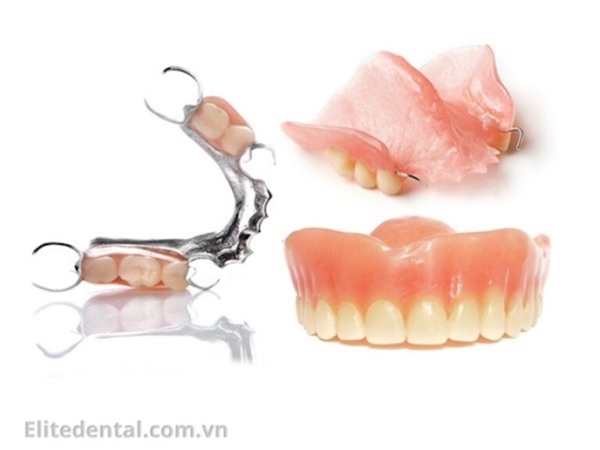
4.2. Dental Bridges
A dental bridge involves the preparation of two healthy adjacent teeth to serve as anchors for the bridge. This method offers a relatively short treatment time and moderate cost. The lifespan of a dental bridge typically lasts around 10 years.
However, the aesthetic result may not achieve the natural look and subtlety of a real tooth, and bone loss can still occur because the bridge does not replace the root of the missing tooth. Over time, the gum may recede, creating a gap between the teeth and the gum. Additionally, the preparation of the two adjacent teeth to support the bridge can weaken these teeth as they bear the entire chewing force. To ensure proper function and aesthetics, patients may need to spend time and money on replacements.
Dental bridges are a common restorative treatment for missing teeth, offering both aesthetic and functional benefits. However, one potential complication associated with dental bridges is alveolar bone resorption, or bone loss. When teeth are lost, the underlying bone begins to deteriorate due to lack of stimulation. While dental bridges can…
4.3. Implants
Dental implants are titanium posts that are highly biocompatible and designed to perfectly replace the lost tooth root, preventing bone loss. The first dental implant procedure was performed by Professor Brånemark in 1965. Over 40 years later, the implanted tooth is still functioning well, even as many natural teeth have been lost due to age. In Vietnam, the first implant was placed at the Central Institute of Odonto-Stomatology (Ho Chi Minh City) in 1994 and is still functioning well today.
Therefore, dental implants are considered the most advanced solution for tooth replacement, addressing the drawbacks of removable dentures and dental bridges. They are increasingly preferred by many people.
Evidence shows that implants post can be used permanently and restore chewing ability by more than 90% with excellent aesthetics. While the cost of dental implant treatment is higher compared to the other two methods, it is considered a cost-effective and optimal choice due to its long-term benefits and prevention of complications.
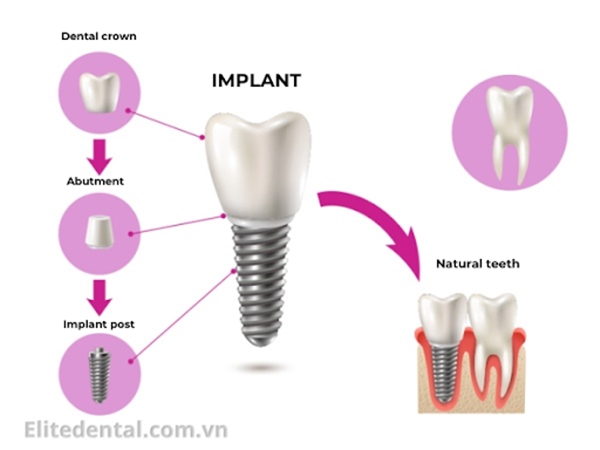
View more: Can dental implants address bone loss? Explanation from a doctor
Elite Dental – A Trusted Destination for Safe and Efficient Dental Implants
For over 12 years, Elite Dental has been providing high-quality dental implant services, successfully handling a wide range of cases from simple to complex, requiring advanced expertise.
At Elite Dental, whether you’re getting a single implant or several implants, you can trust that you’ll receive a durable new set of teeth, allowing you to smile confidently and enjoy your favorite foods. Elite Dental offers exceptional advantages:
- Experienced Team: The team at Elite Dental has over 15 years of experience in dental implant procedures, successfully treating many cases, including complex ones involving elderly patients.
- Advanced Technology: The examination, diagnosis, and treatment processes at Elite Dental utilize digital techniques and state-of-the-art equipment, ensuring a comfortable and effective treatment experience with long-lasting results.
- State-of-the-Art Facilities: Elite Dental features a dedicated implant surgery room designed to international standards with a clean, sterile environment, ensuring maximum safety and privacy for patients.
- Premium Aftercare: The clinic provides a 5-star recovery and post-surgery care room, offering patients comfort and satisfaction.
- Genuine Implants and Materials: Elite Dental guarantees the use of 100% authentic implant posts and dental materials with clear origin labels and warranty policies, contributing to a success rate of up to 99.8% (certified by the leading global Implant Group Straumann).

>> Implants are the optimal solution for restoring lost teeth, allowing individuals to smile confidently, eat comfortably, and enhance their quality of life. For detailed consultation and to schedule an appointment with a doctor, please contact Elite Dental!
5. How to Prevent Tooth Loss
To prevent tooth loss, you can apply the following recommended measures:
- Brush your teeth at least once a day and after meals within 30 minutes.
- Use dental floss and mouthwash after meals to clean food debris from between teeth and reduce bleeding gums caused by long-term use of toothpicks.
- Visit a dentist regularly every 6 months to promptly treat dental issues and prevent tooth loss.
- Address dental problems such as cavities, gum disease, and dental abscesses early. Avoid letting these conditions persist, as they can lead to pulpitis and tooth loss.
Through this article, you should now understand the consequences of tooth loss. Don’t let tooth loss hinder your life. Elite Dental is always ready to offer free consultations for all dental conditions. Contact us HERE or call our Hotline at (+84) 28 7306 3838 for prompt and thorough support.
Related posts: > Reasons for Molar Tooth Loss, Its Effects, and the Best Solutions > What’s the optimal way to restore full-mouth tooth loss? > Six common oral care mistakes you need to be aware of


